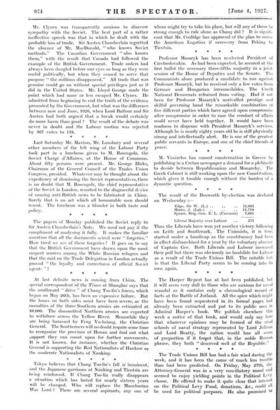Mr. Clynes. was transparently anxious to disavow sympathy with the
Soviet. The best part of a rather ineffective speech was that in which he dealt with the probable loss of trade. Sir Austen Chamberlain regretted the absence of Mr. MacDonald, " who knows Soviet methods." The Canadian Government " also knows them," with the result that Canada had followed the example of the British Government. Trade orders had always been dangled before our eyes so long as they were useful politically, but when they ceased to serve that purpose " the millions disappeared." All trade that was genuine could go on without special privileges just as it did in the United States. Mr. Lloyd George made the point which had more or less escaped Mr. Clynes. He admitted from beginning to end the truth of the evidence presented by the Government, but what was the difference between now and June, 1926, when Lord Balfour and Sir Austen had both argued that a break would certainly do more harm than good ? The result of the debate was never in doubt and the Labour motion was rejected by 367 votes to 118.






































 Previous page
Previous page